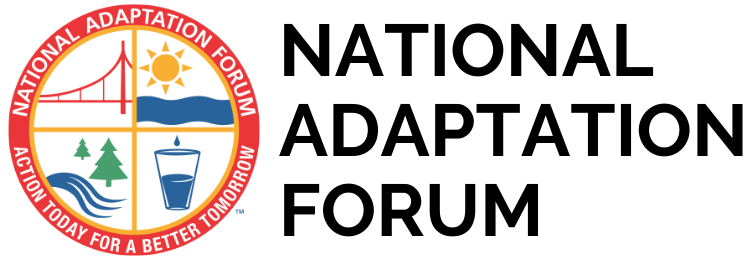The National Adaptation Forum Diversity, Equity, Inclusion, and Belonging Goals were developed by the Forum’s Equity and Climate Justice Working Group in 2024. Our purpose in posting these goals online is to provide transparency in what we hope to achieve at the Forum. In addition, we aimed to provide periodic goal updates as a measure of accountability in the lead up to the 6th National Adaptation Forum, so we may better understand where we’re succeeding and where we’re falling short.
National Adaptation Forum Diversity, Equity, Inclusion, Justice, and Belonging Goals
In the effort to continue making the National Adaptation Forum more diverse, inclusive, and equitable, the Forum is employing a variety of strategies to simultaneously center perspectives of frontline communities – or communities that face a disproportionate burden of climate risks while experiencing additional barriers to adapt and respond to climate change – while improving participation rates of frontline community groups as presenters and attendees.
As part of this effort, the Forum recognizes that there are many people that have been (and often continue to be) excluded, underrepresented, and unrepresented in conversations around climate risks and adaptation in the US, including Black communities, Tribal Nations and Indigenous peoples, Latino or Latinx communities, Asian communities, Pacific Islanders, immigrants, people whose primary language isn’t English, LGBTQIA+, people with disabilities, people who are neurodivergent, religious minorities, among others. Additionally, the Forum recognizes that racial identity is often times a predominant factor in determining professional mobility and access to resources and opportunities, particularly within the climate adaptation field and the broader sustainability field. In particular, people who have multiple intersecting identities often experience added layers of structural barriers that compound the challenges for those individuals to meaningfully participate within the climate adaptation field, including attending events like the National Adaptation Forum.
The sections below detail some of the ways the Forum is centering racial equity and justice into its programming to continue building a climate adaptation field that is more diverse, inclusive, equitable, and just. Various strategies name specific frontline groups, acknowledging that different groups will require different engagement approaches.
The entire Forum planning team – including EcoAdapt, Delaney Event Management, and the Forum’s committees – are committed to continuing to improve how we center equity and justice into the Forum’s programming. If you have additional ideas or feedback, please contact info@nationaladaptationforum.org.
*In the goals below, we often refer to underrepresented or unrepresented groups. Please read the paragraphs above for a specific definition of who we are referring to when we reference these groups.

